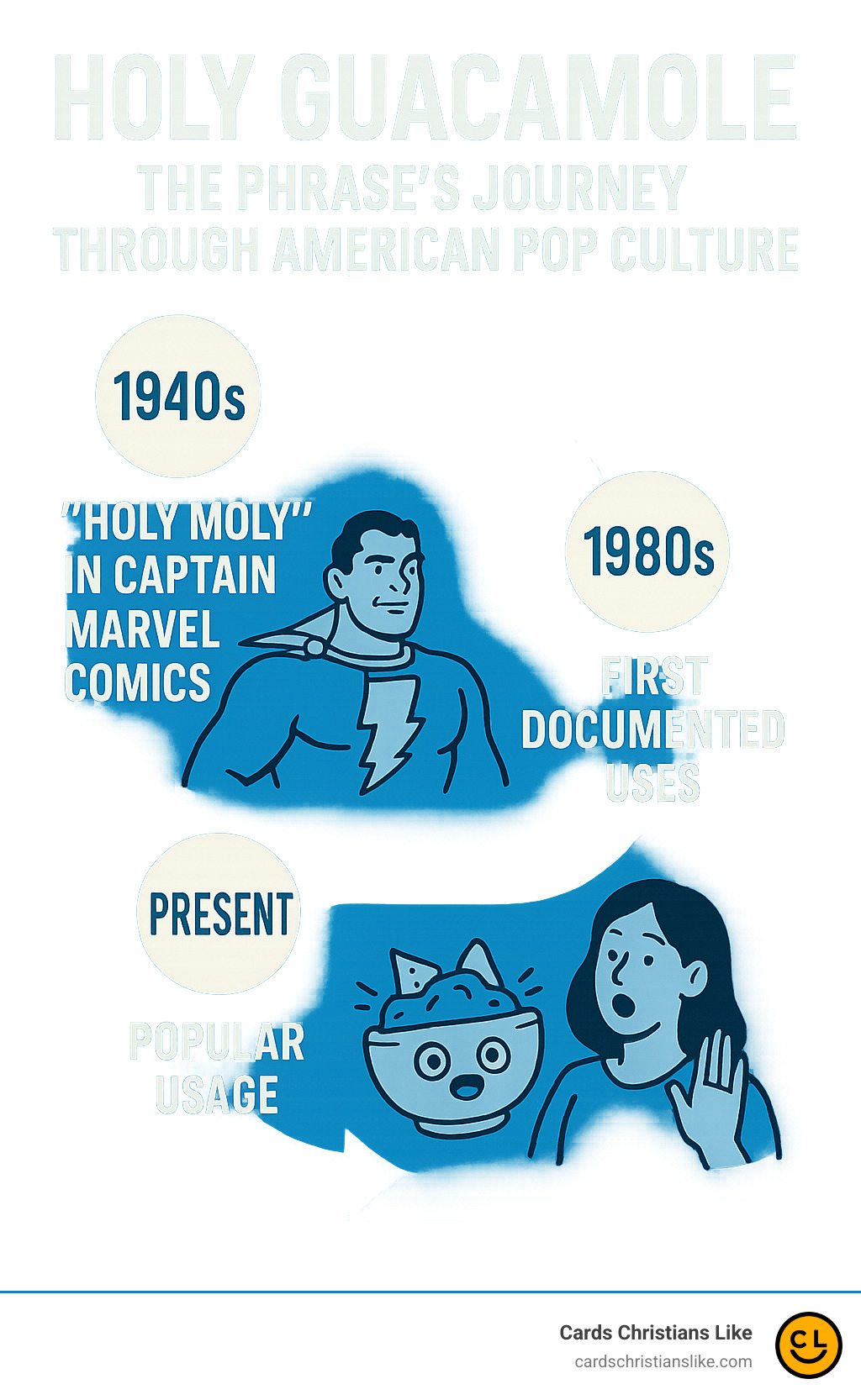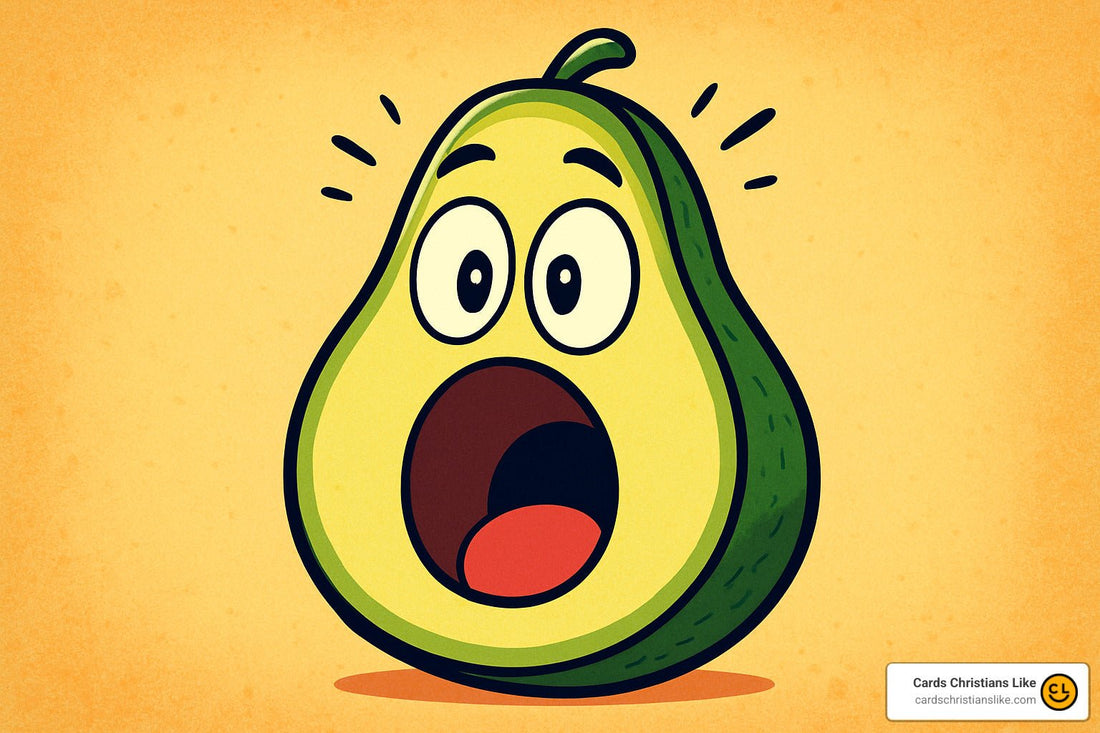The Surprising Story Behind a Quirky Exclamation
"Holy guacamole meaning" refers to a playful exclamation of surprise, astonishment, or excitement used in casual conversation. This family-friendly phrase serves as a humorous euphemism for stronger language while adding a touch of lighthearted energy to your speech.
Quick Answer: What Does "Holy Guacamole" Mean? * A mild, humorous exclamation expressing surprise or amazement * Functions as a euphemistic alternative to "holy sh*t" * Chosen primarily because "guacamole" rhymes with "holy" * Suitable for family-friendly settings where stronger language is inappropriate * Popularized through comics, TV shows, and everyday speech since the 1980s
Have you ever found yourself in a situation so surprising that you needed to express your astonishment, but wanted to keep things clean and family-friendly? That's exactly where "holy guacamole" shines! This charming expression combines the traditional exclamatory "holy" with the unexpected food reference "guacamole," creating a rhyming phrase that's both memorable and inoffensive.
The expression gained popularity as part of a broader family of "holy" exclamations, including classics like "holy cow" and "holy moly." Unlike these older cousins which have historical or religious roots, "holy guacamole" exists primarily because it sounds catchy and provides a humorous alternative to more vulgar expressions.
What makes this phrase particularly interesting is how it blends linguistic playfulness with food culture. While there's no actual connection between moments of surprise and the popular avocado-based dip, the unexpected pairing creates just enough novelty to make the expression stick in our collective vocabulary.
I'm Daniel Maddry, founder of Cards Christians Like, and I've explored the holy guacamole meaning extensively when developing family-friendly party games that incorporate clean humor and culturally relevant expressions Christians can enjoy without reservation.

What Does "Holy Guacamole" Mean?
Ever blurted out something unexpected when you're totally shocked? That's where "holy guacamole meaning" comes into play! At its heart, this charming expression is simply a mild exclamation people use when they're surprised, astonished, or excited about something.
Linguists would call "holy guacamole" a "minced oath" – basically a polite substitute for something that might raise eyebrows in mixed company. It works as a family-friendly alternative to "holy sh*t," letting you express those big emotions without dropping words that might make Grandma faint at Sunday dinner.
The funny thing is, guacamole itself has absolutely nothing to do with surprise or excitement. This delicious avocado dip earned its place in this expression purely because it rhymes with "holy" – creating a phrase that's both memorable and fun to say. According to Wiktionary, the phrase functions purely as an interjection expressing astonishment.
Everyday "holy guacamole meaning" in Conversation
In real-life conversations, "holy guacamole" adds a splash of personality and humor. It's the perfect go-to when your friend announces she's engaged ("Holy guacamole, congratulations!"), when your favorite team scores in the final seconds ("Holy guacamole, what a comeback!"), or when your toddler creates an unexpected masterpiece on your living room wall ("Holy guacamole, that's... creative!").
What makes this expression special is its inherently light-hearted tone. Unlike stronger language that might escalate tension, "holy guacamole" often diffuses it with a touch of silliness. This makes it perfect for family gatherings, church events, or any setting where keeping things positive matters.
I've noticed that phrases like this work beautifully in our games at Cards Christians Like because they let players express genuine excitement while staying comfortably within boundaries everyone can appreciate. There's something refreshingly authentic about an expression that carries emotional weight without crossing lines.
Comparing to Vulgar Exclamations: Why We Swap Them Out
So why do we reach for phrases like "holy guacamole" instead of their more colorful cousins? It comes down to social awareness and consideration for others.
| "Holy Guacamole" | "Holy Sh*t" |
|---|---|
| Family-friendly | Contains profanity |
| Playful, humorous tone | More aggressive tone |
| Suitable for all ages | Inappropriate in many settings |
| Adds levity to a situation | Can intensify tension |
| Creative linguistic play | Less imaginative |
This substitution follows a beautiful tradition in language where we create euphemisms through rhyming or similar-sounding words. It's a clever compromise that satisfies both our need to express strong emotions and our desire to keep conversations appropriate for everyone present.
When developing games that bring people together, I've found that expressions like "holy guacamole" create spaces where multiple generations can laugh and play without anyone feeling uncomfortable. It's not about censorship – it's about finding creative ways to communicate that respect everyone at the table while still keeping things lively and authentic.
Where Did "Holy Guacamole" Come From? The Origin Story
Ever wondered how this quirky phrase landed in our everyday vocabulary? The story behind "holy guacamole meaning" is as delightful as the expression itself!
The journey begins with a long tradition of "holy" exclamations in American English. Before anyone was shouting about avocado dip, people were expressing surprise with phrases like "Holy Moses" (dating back to the 19th century), "Holy cow" (early 20th century, possibly referencing sacred cows in Hinduism), and "Holy moly" (which gained traction in the 1940s).
"Holy moly" deserves special mention as it established something important: pairing "holy" with a word that rhymes purely for its sound rather than its meaning. Captain Marvel comics made this catchphrase a household favorite, planting seeds for future variations like our beloved guacamole version.
The 1960s Batman TV series took this linguistic pattern to new heights. Remember Robin's enthusiastic "Holy smoke, Batman!" and "Holy catastrophe, Batman!"? These catchphrases showed just how versatile and fun the "holy + noun" formula could be while keeping things family-friendly.
As for "holy guacamole" specifically, it made its documented debut in the 1980s – perfectly timed with the rising popularity of Mexican cuisine in American culture. While earlier uses might exist, the phrase gained momentum as guacamole itself became a familiar sight on American tables.
The word itself has ancient roots – "guacamole" comes from Nahuatl (the Aztec language), combining āhuacatl (avocado) and mōlli (sauce) to form āhuacamōlli. This exotic, rhythmic word was practically destined for catchphrase stardom!

Why "Guacamole"? Food Fame & Fun Rhyme
So why did guacamole – of all foods – earn this special place in our exclamations? Two key ingredients made this phrase stick:
First, the food's rising popularity created the perfect conditions. Starting in the 1970s and gaining serious momentum through the 80s and 90s, guacamole transformed from an exotic foreign dish to an American staple. When Americans started consuming millions of pounds of avocados during Super Bowl weekends and making guacamole a must-have at parties, the word became part of our everyday vocabulary.
Second, that perfect rhyming quality can't be overlooked. "Guacamole" rhymes beautifully with "holy," creating a satisfying four-syllable phrase that simply feels good to say out loud. It has a musical, playful quality that makes it more memorable than many other potential "holy" pairings.
These factors combined at just the right moment – a culturally significant food emerged when people were actively seeking creative, non-offensive exclamations. The result? A catchphrase that has stood the test of time!
Timeline of "holy guacamole meaning" in Print & Media
While pinpointing the exact birth of "holy guacamole" is tricky, we can trace its growing popularity through various media:
In the 1970s, early instances appeared in television dialogue, though documentation is limited. By the early 1980s, the phrase began showing up in newspaper articles and casual writing, with one of the earliest documented print appearances coming in 1983.
The 1990s saw the expression becoming increasingly common in children's media and family programming, where writers needed colorful, emotion-packed phrases without inappropriate language. By the 2000s, "holy guacamole" had earned spots in young adult novels, including works by popular authors like Rick Riordan, introducing the phrase to new generations.
From the 2010s onward, the expression has firmly established itself in our cultural lexicon, appearing in memes, across social media platforms, and in everyday conversations around dinner tables and playground alike.
At Cards Christians Like, we appreciate expressions that convey excitement while keeping things appropriate for all ages – exactly what makes "holy guacamole" such a perfect exclamation for family game nights!
How and When to Use "Holy Guacamole"
Now that we understand what "holy guacamole" means and where it came from, let's explore when you might want to pull this playful phrase out of your conversational toolbox.
This colorful expression shines brightest in moments of genuine surprise—like when your friend reveals they're expecting twins or when you narrowly avoid stepping in a puddle. It's perfect for expressing delight ("Holy guacamole, we got front-row tickets!") or adding a touch of humor when recounting a surprising story to friends.
The beauty of "holy guacamole" is how it lets you express strong emotions without crossing into inappropriate territory. I've found it particularly useful during family game nights when someone makes an unexpected move that would normally tempt me to say something stronger!
While decidedly American in flavor, the phrase has traveled well to other English-speaking countries. It carries a slightly nostalgic quality that makes it both endearing and occasionally the recipient of good-natured eye-rolls from teenagers who might find it charmingly outdated when parents use it.
Formal vs. Informal Settings
Let's be clear—this is definitely an expression for casual settings. You'll want to save "holy guacamole" for:
- Relaxed conversations with friends and family
- Your personal social media posts and text messages
- Informal writing like emails to friends or your personal blog
- Fun gatherings like game nights with our Cards Christians Like games
On the flip side, you probably shouldn't exclaim "holy guacamole!" during a job interview, in your thesis paper, or while delivering a eulogy. The phrase feels out of place in formal business communications, academic writing, or serious presentations.
This expression works wonderfully in Party Games That Won't Make Grandma Blush because it hits that sweet spot—expressive enough to convey excitement while remaining appropriate for players of all ages and sensibilities.
Similar "Holy" Expressions Around the World
"Holy guacamole" isn't alone in mild exclamations. Many cultures have developed their own colorful ways to express surprise without resorting to profanity.
Americans might also say "Holy mackerel!" or the classic "Holy smokes!" Spanish speakers often exclaim "Madre mía!" (literally "my mother!"), while French speakers might use the now somewhat old-fashioned "Sacré bleu!" Italians have given us "Mamma mia!" which most of us recognize even if we don't speak Italian.
English offers plenty of alternatives too, from the Charlie Brown favorite "Good grief!" to the Australian/British "Crikey!" and the traditional British "Blimey!" All these expressions serve the same purpose—giving us a way to express strong emotions without causing offense.
Sample Sentences to Try Out
If you're looking to incorporate "holy guacamole" into your everyday language, natural usage is key. Here are some examples that won't sound forced:
"Holy guacamole! That thunder nearly shook the house!"
"I opened my credit card statement and holy guacamole, I spent way more than I thought last month."
"Holy guacamole, that car came out of nowhere! Good thing you were paying attention."
"When she showed me the engagement ring, all I could say was 'holy guacamole, that's gorgeous!'"
"Holy guacamole, have you seen how much college tuition has increased since we went to school?"

The secret to using this expression effectively is authenticity—save it for those genuinely surprising or exciting moments. Like any seasoning, overuse can diminish its impact. When used at just the right moment, though, "holy guacamole" adds a dash of wholesome personality to your speech that's both expressive and family-friendly.
"Holy Guacamole" in Pop Culture & Public Opinion
Let's be honest—few phrases manage to be both silly and endearing at the same time, but "holy guacamole" pulls it off with aplomb. This colorful expression has popped up all over the entertainment landscape, working its way into our hearts through various media channels.
Remember those Saturday morning cartoons you used to watch? Many featured characters exclaiming "holy guacamole!" when faced with something surprising. Children's television acceptd the phrase throughout the 1990s and 2000s as a perfect G-rated substitute for stronger language. Family movies, especially animated films, adopted it too when writers needed colorful expressions that wouldn't raise parental eyebrows.
Literature hasn't been immune to its charms either. Rick Riordan, author of the wildly popular Percy Jackson series, incorporated the phrase into his young adult novels, introducing it to a whole new generation of readers. Comics and graphic novels have continued the tradition as well, keeping alive the legacy that began with those "holy" exclamations from Batman's sidekick decades ago.
Food marketers, always clever folks, quickly recognized the dual opportunity here. What better way to sell guacamole products than with a built-in exclamation that already suggests excitement? The phrase has appeared in countless promotional campaigns, creating a perfect marriage between linguistic playfulness and avocado sales.
In today's digital landscape, "holy guacamole meaning" continues evolving as the phrase appears in memes, reaction GIFs, and social media posts whenever someone wants to express surprise without crossing language boundaries.
Public reaction to the phrase tends to split along interesting lines. I've noticed that older adults often appreciate its clean, inoffensive nature—it's an exclamation you can use around the grandkids without worry. Middle-aged folks might feel a twinge of nostalgia when they hear it, reminiscent of expressions from their youth. Younger generations sometimes accept it as charmingly retro, while others might respond with an affectionate eye-roll at its perceived corniness.
Praise, Groans, and Eye-Rolls
What makes "holy guacamole" so fascinating is its ability to endure despite (or perhaps because of) mixed reception. Some language critics dismiss it as silly because it exists solely for its rhyming quality rather than any logical connection between mashed avocados and moments of surprise. But isn't that playful, almost nonsensical quality exactly what gives it charm?
Those who love the phrase often point to its family-friendly nature and playful rhythm. There's something genuinely satisfying about how it rolls off the tongue. It effectively serves as a clean alternative to profanity while adding a touch of humor through the unexpected food reference. When tension runs high, sometimes a ridiculous food-based exclamation is exactly what you need to lighten the mood.
Critics, meanwhile, point to its perceived childishness and the completely arbitrary food connection. Some feel that "holy" expressions in general feel dated, preferring either more straightforward reactions or more creative contemporary expressions.
At Cards Christians Like, we've finded that phrases like "holy guacamole" work beautifully in our games because they create common ground between generations. Grandparents recognize it, parents grew up with it, and even teenagers understand it—making it perfect for family game nights where everyone should feel included in the fun. These expressions allow players to react expressively without making anyone uncomfortable.
The Real Guacamole Connection
While there's no logical reason why surprise should be connected to mashed avocados, the parallel rise of both the food and the expression creates a fascinating cultural synchronicity.
Guacamole itself has an impressive history. Originating with the Aztecs in Mexico around the 16th century, its name combines the Nahuatl words "ahuacatl" (avocado) and "molli" (sauce). For centuries, it remained primarily a Mexican dish before beginning its journey into mainstream American cuisine in the mid-20th century.
Today, guacamole has achieved nothing short of iconic status in American food culture. The statistics are staggering—Americans consume over 8 million pounds of guacamole during the Super Bowl alone. Avocado imports to the US have skyrocketed year over year, and phrases like "guac is extra" have become cultural touchpoints understood across generations. From fast food joints to five-star restaurants, guacamole has secured its place on menus nationwide.

This parallel rise created a wonderful synergy. As guacamole became familiar to more Americans, the phrase "holy guacamole" felt increasingly natural. At the same time, the popular expression may have contributed to guacamole's cultural status. It's a chicken-and-egg situation with avocados!
Marketing teams have certainly capitalized on this connection. Restaurants and food brands frequently use "Holy Guacamole!" in promotions for avocado products, creating an immediate association with excitement and enjoyment. The phrase provides a ready-made exclamation that perfectly aligns with food marketing goals—who wouldn't want to try a dip that inspires such enthusiasm?
In our card games at Cards Christians Like, we accept these kinds of culturally-relevant yet clean expressions. They add flavor and personality while remaining appropriate for church groups, family gatherings, and mixed-age settings where everyone should feel comfortable joining in the fun.
Frequently Asked Questions about holy guacamole meaning
When did the phrase first appear?
Tracing the exact birth of "holy guacamole" is a bit like finding the first person who ever said "cool" – it's tricky! The phrase began popping up in print and media during the 1980s, right around the time Americans were falling in love with Mexican cuisine. Like most catchy sayings, it probably bounced around in everyday conversations before anyone thought to write it down.
By the 1990s, you'd hear "holy guacamole" regularly in Saturday morning cartoons and family TV shows. The expression didn't appear out of nowhere, though – it built upon a long tradition of "holy" exclamations that Americans already loved. Think of it as the younger sibling to phrases like "holy cow" (which gained popularity in the early 1900s) and "holy moly" (which Captain Marvel comics made famous in the 1940s).
What makes this phrase special is how it took the familiar "holy" formula and gave it a fresh, food-inspired twist just as avocados were becoming a staple in American kitchens. Perfect timing, really!
Is "holy guacamole" offensive to anyone?
Good news! "Holy guacamole" lands firmly in the category of expressions that won't make your grandmother blush or cause awkward silences at the dinner table. It's specifically designed as a family-friendly alternative to stronger language.
Some particularly sensitive religious folks might raise an eyebrow at any phrase starting with "holy," seeing it as potentially taking the Lord's name in vain. However, most people recognize that pairing "holy" with something as obviously non-sacred as mashed avocados signals this is just playful language rather than anything religiously problematic.
From a cultural perspective, the reference to guacamole (a food with Mexican origins) isn't generally considered disrespectful. If anything, the phrase celebrates rather than mocks the food. The expression focuses on how the word sounds rather than making any commentary about Mexican culture.
At Cards Christians Like, we're particularly attuned to language that works for faith communities, and "holy guacamole" passes the test for most Christian gatherings. It provides that emotional release of an exclamation without crossing into territory that might make people uncomfortable.
Can I use it in professional writing?
Let's be honest – "holy guacamole" probably doesn't belong in your doctoral dissertation or quarterly business report. It's primarily an informal expression that shines in casual settings but feels out of place in formal professional writing.
I wouldn't recommend using it in: * Business reports or proposals * Academic papers or research * Legal documents * Formal correspondence with clients * Professional presentations to executives
That said, the working world isn't always stiff and formal. The phrase might fit perfectly in: * Team emails with colleagues you know well * Creative marketing copy for brands with a playful voice * Social media posts for companies with a casual approach * Blog posts written in a conversational tone * Internal company newsletters meant to feel friendly
The key is knowing your audience and context. At Cards Christians Like, we occasionally use expressions like this in our marketing materials because they match our friendly, family-oriented brand voice. When we're writing game instructions or promotional materials, a touch of playful language helps convey our product's fun nature. However, we switch to more formal language when communicating with retail partners or handling legal matters.
Bottom line: if your professional writing aims to be approachable and your audience appreciates a friendly tone, "holy guacamole" might occasionally be just right. But when in doubt, err on the side of formality – you can always loosen up later!
Conclusion
The holy guacamole meaning journey we've explored together reveals something truly fascinating about language—it's alive, constantly evolving to help us express our feelings while staying within social boundaries. This quirky little phrase shows just how creative we humans can be when we need to express surprise without crossing into inappropriate territory.
From its humble beginnings as likely just another variation in the "holy" exclamation family to becoming a recognized idiom that most Americans instantly understand, "holy guacamole" has earned its place in our linguistic landscape. What's remarkable is how it's persisted despite some folks dismissing it as silly or arbitrary. There's something about its rhythmic quality and lighthearted tone that just works.
I find it particularly interesting how this phrase reflects America's cultural melting pot. Here we have a reference to a Mexican food that's become so thoroughly integrated into American life that we've woven it into our everyday expressions. It's a small but meaningful example of how cultures blend and borrow from each other in beautiful ways.
At Cards Christians Like, we've acceptd expressions like "holy guacamole" in our games because they hit that sweet spot—they're expressive and fun while remaining appropriate for everyone from kids to grandparents. Down here in Florida, we're passionate about creating experiences that bring people together through humor that doesn't require anyone to compromise their values.
Whether you're a fan of saying "holy guacamole" or you find it a bit cheesy, understanding where it came from helps us appreciate the rich mix of English expressions. Language is a wonderful tool that adapts to our needs, and this phrase shows how we can be both expressive and considerate at the same time.
So the next time something surprising happens during your family game night, go ahead and let out a "Holy guacamole!" Everyone will know exactly what you mean, and nobody will need to cover the little ones' ears. That's the beauty of a good euphemism!
For more fascinating articles on language, culture, and clean family fun, check out our blog on language & culture.


